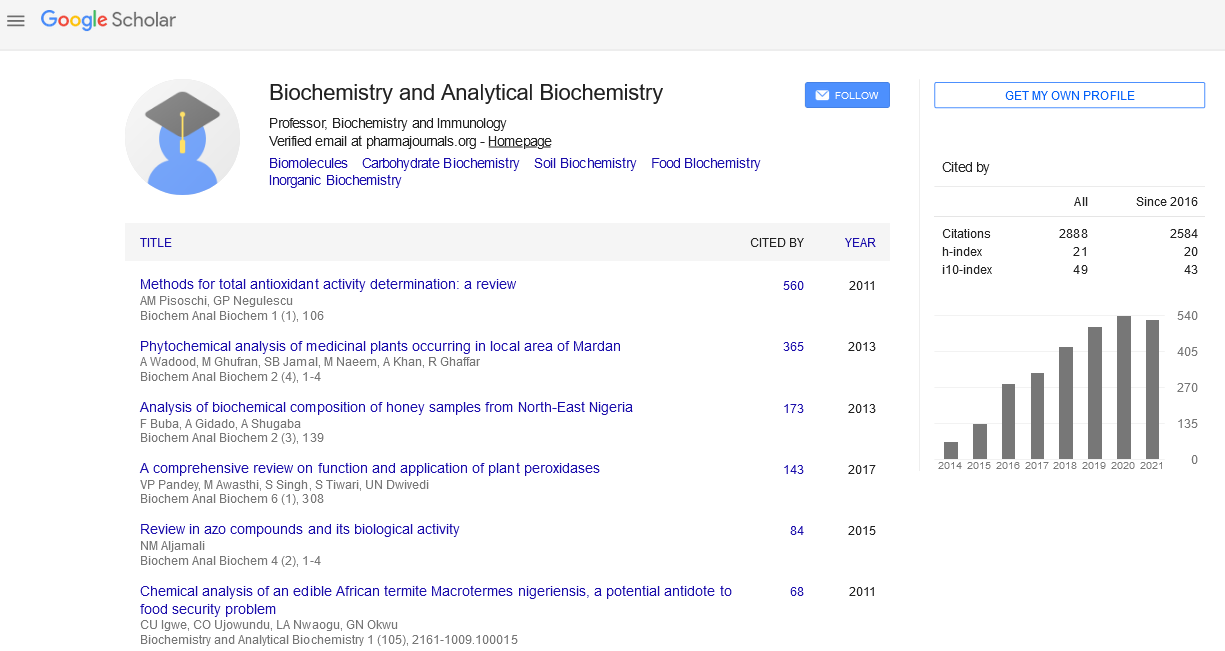Indexed In
- Open J Gate
- Genamics JournalSeek
- ResearchBible
- RefSeek
- Directory of Research Journal Indexing (DRJI)
- Hamdard University
- EBSCO A-Z
- OCLC- WorldCat
- Scholarsteer
- Publons
- MIAR
- Euro Pub
- Google Scholar
Useful Links
Share This Page
Journal Flyer

Open Access Journals
- Agri and Aquaculture
- Biochemistry
- Bioinformatics & Systems Biology
- Business & Management
- Chemistry
- Clinical Sciences
- Engineering
- Food & Nutrition
- General Science
- Genetics & Molecular Biology
- Immunology & Microbiology
- Medical Sciences
- Neuroscience & Psychology
- Nursing & Health Care
- Pharmaceutical Sciences
Vitamin A metabolism: A switch between obesity and thermogenesis
International Conference and Exhibition on Biochemical & Molecular Engineering
October 07-08, 2013 Hilton San Antonio Airport, TX, USA
Ouliana Ziouzenkova
Scientific Tracks Abstracts: Biochem Anal Biochem
Abstract:
Our research is aimed at addressing the needs of 90 million obese American and 150 million obese patients worldwide. Visceral fat (VF), even in lean patients, poses risks for degenerative and inflammatory diseases, such as type 2 diabetes, cardiovascular disease, and some cancers. We elucidated the role of retinoic acid (RA) production by aldehyde dehydrogenase 1 (Aldh1a1, a2, a3), the major RA-producing enzyme, on sex-specific fat depot formation. Female Aldh1a1 -/- (A1KO) mice but not males, were resistant to high-fat (HF) diet-induced visceral adipose formation due to the increased thermogenesis in their tissue. We translate our findings for the antiobesity therapy. We engineered A1KO-green fluorescent fibroblasts (A1KO G ) maintaining thermogenic characteristics in vitro and in vivo . For transplantation, cells were encapsulated in the nano porous polymer. Encapsulation protects the cells from immune rejection and ensures their long-term survival in the treated fat tissue. Injected encapsulated thermogenic cells in white fat depots mimic brown fat. Encapsulated A1KO G fibroblasts were injected into VF of obese wild-type (WT) mice fed a HF diet for 80 days. This treatment reduced lipids stored in VF by 23% in treated vs. non-treated mice on the same HF diet, while non-injected subcutaneous fat was not influenced. The reduction of VF in WT mice treated with encapsulated A1KO G cells was due to thermogenesis in encapsulated A1KO G cells and also dramatic thermogenic remodelling of WT VF. This treatment strategy opens an opportunity for fat depot-specific obesity treatment.
Biography :
Ouliana Ziouzenkova is an Assistant Professor at The Ohio State University (OSU). She received a bachelors and masters degree from The KievState University, Ukraine, and Ph.D. at the University of Graz, Austria. Her post-doctoral training was at the University of Southern California and Brigham and Womens Hospital, Boston, MA. She has been honored with the Basic Science Award by the American Heart Association, the Lerner Young Faculty Award at BWH. She serves on an editorial board for Vitamins & Trace Elements, Internal Medicine and a guest editor for BBA Molecular and Cell Biology of Lipids. She leads a research team fostering innovative approaches in anti-obesity therapies.


